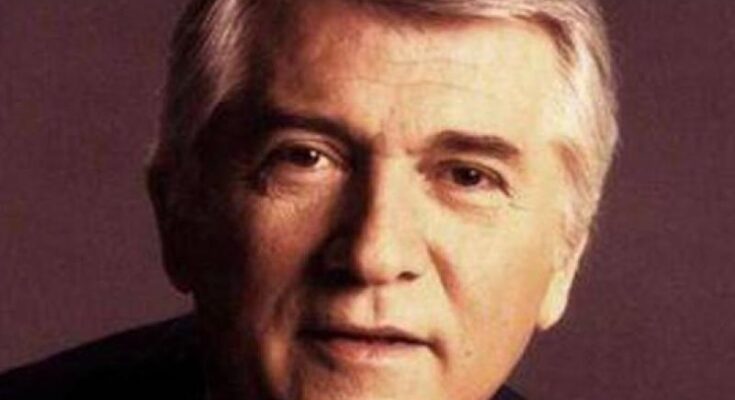
It was September 26, 1989 when former publisher and New Democracy MP Pavlos Bakoyannis was assassinated by three members of the November 17 terrorist group outside his office in downtown Athens.
It was a dastardly crime which shook Greece’s political world to its very core.
The year 1989 had already proved to be a turbulent one for Greece. After eight years of rule by PASOK, the New Democracy Party won two national elections in June and November of 1989, but in neither one had it gained the absolute majority needed to govern.
An “Ecumenical Government” was finally formed on November 23, under Prime Minister Professor Xenophon Zolotas, who was supported by New Democracy, PASOK and the Coalition of the Left.
But before that, the murder of Bakoyannis and the attempt to kill New Democracy president Konstantinos Mitsotakis on October 21 had added more fuel to the already volatile atmosphere.
Bakoyannis, a publisher and journalist, was the owner of the Grammi AE media publishing company before he was elected to Parliament as a member of the New Democracy party in the June elections.
He was a low-profile politician who eschewed grand gestures and populism. The goal of the new conservative party MP was to bring about some much-needed national reconciliation in a country which was still suffering from the wounds of the Civil War decades after its end.
Bakoyannis’ opposition to the junta
Bakoyannis was born February 10, 1935 in Velota, in Evrytania prefecture, and went on to study Political and Social Sciences at Panteion University. He continued his studies in Germany, earning a degree in Political Economics and Political Science from the Universities of Munich, Tubingen and Konstanz, where he received a Doctor of Social Sciences degree.
He then taught Political Science and Journalism at the University of Munich, and beginning in the mid-1960s he produced a Greek-language radio program in Bavaria for about ten years.
Bakoyannis was still serving as the director of the Greek program of Bavarian Radio when the April 21, 1967 coup took place in Greece. The professor used his position to oppose the dictatorial regime, issuing commentary which was also transmitted by Deutsche Welle. His work soon made him a well-known figure in the opposition to the military regime in Greece.
While in Munich, he met Dora Mitsotakis, the daughter of former prime minister Konstantinos Mitsotakis, who was also studying at Munich University. The two were married in 1974 and had two children, Alexia and Kostas. Kostas Bakoyannis was elected the mayor of Athens in July of 2019.

Bakoyannis and his young family returned to Greece after the restoration of democracy there.
After he was elected as an MP, Bakoyannis was in frequent contact with the Coalition of the Left party to discuss the painful issues which still divided much of Greece into extreme leftist and rightist camps, and invited them to join New Democracy in a coalition government.
He was the rapporteur on behalf of ND for a bill calling for the prosecution of crimes which may have been committed as a result of the Civil War to be nullified, which was voted into law in the summer of 1989.
In fact, the night before his murder, Bakoyannis was at the Coalition of the Left offices and had asked his bodyguard to not escort him to his office the following morning because it was late at night when they left, according to his widow, Dora Bakoyanni.
Shot and killed outside his office by November 17 terrorists
It was 7:58 in the morning when the politician arrived alone at his office building on Omirou Street in Kolonaki. When he entered the lobby, three men walked in behind him and shot him point-blank. He was shot twice in the back and then again on his side while he was lying on the floor.
Bakoyannis died one hour later at Athens’ Evangelismos Hospital. He was only 54 years of age.
The November 17 terrorist organization promptly claimed responsibility for Bakoyannis’ assassination. In a 12-page proclamation sent on October 9 to the newspaper Eleftherotypia, entitled “The Purge Began,” it stated inter alia that “We have therefore decided to execute the fraud and robber of the people Bakoyannis.
“He is responsible not only for stealing the first 60 million of the founding capital for Grammi, but also for the hundreds of millions he stole with his partner Koskotas for raising the Grammi share capital, but also for buying the Bank of Crete through Grammi,” the screed concluded.
At the time, the notorious “Koskotas Scandal” was at the epicenter of politics and of Greek society in general. Wealthy businessman Giorgos Koskotas had bought the media and publishing company “Grammi AE” from Bakoyannis in 1982, and in 1984 he bought a 56-percent share of the Bank of Crete’s equity, later to acquire 82 percent.
In 1987, Koskotas bought the Olympiacos Football Club, which soon began to trade players for astronomical sums of money.
By the end of the decade, the businessman had bought opposition newspapers and turned them into PASOK-friendly entities. Soon he was accused of having shady dealings with top PASOK politicians, allegedly including then-prime minister Andreas Papandreou.
Koskotas was never audited for any of his business deals nor for the activities of the Bank of Crete.
The November 17 terrorists Dimitris Koufodinas, Heraklis Kostaris, Alexandros Giotopoulos, Savvas Xiros and Vassilis Tzortzatos were all found guilty of the assassination of Bakoyannis on December 17, 2003.
Koufodinas is serving eleven life terms for the attack. Giotopoulos received seventeen life sentences plus 25 years for his crimes as part of the November 17 group. Kostaris received a life sentence for his part in the Bakoyannis murder.
Xiros and Tzortzatos received 15 years for their roles in the attack.
November 17 is responsible for the assassinations of a total of 23 people, including politicians and foreign diplomats, during the years 1975-2000.



